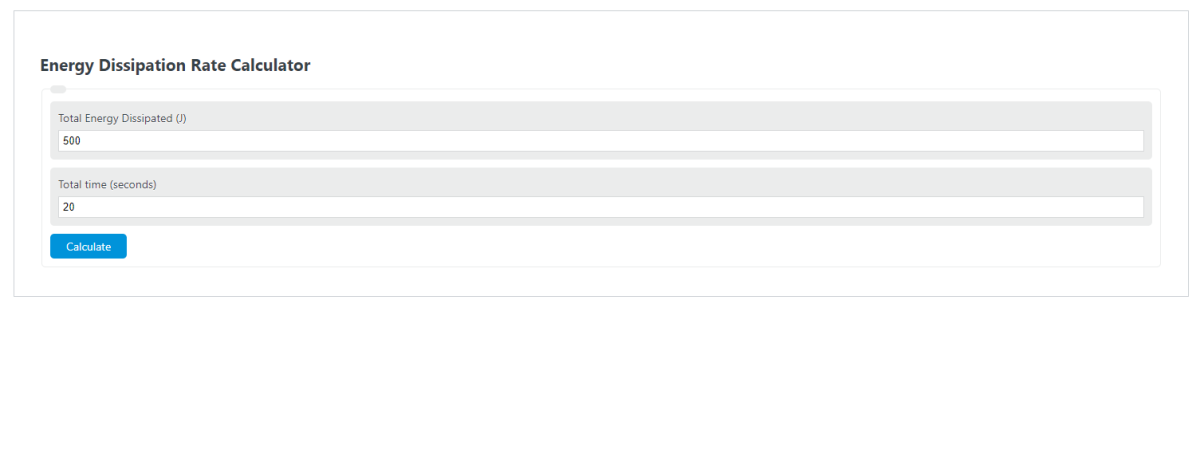Enter the total energy dissipated from point 1 to point 2 and the total time that has passed into the calculator to determine the energy dissipation rate.
- Energy Loss Calculator
- Heat Dissipation Calculator
- Heat Absorption Calculator
- Pipe Fiction Loss Calculator
Energy Dissipation Rate Formula
The following equation is used to calculate the Energy Dissipation Rate.
E = TED / T
- Where E is the Energy Dissipation Rate (J/s)
- TED is the total amount of energy dissipated from point 1 to point 2 (J)
- T is the total amount of time (s)
To calculate the Energy Dissipation Rate, divide the total amount of energy dissipated by the total amount of time.
What is an Energy Dissipation Rate?
Definition:
An energy dissipation rate is the amount of energy per unit of time a system can dissipate. The higher the dissipation rate, the better the performance of the machine.
How to Calculate Energy Dissipation Rate?
Example Problem:
The following example outlines the steps and information needed to calculate Energy Dissipation Rate.
First, determine the total amount of energy dissipated. In this case, the system dissipated 500 Joules.
Next, determine the total amount of time. This is found to be 20 seconds for this example,
Finally, calculate the energy dissipation rate using the formula above:
E = TED / T
E = 500 / 20
E = 25 J/s
FAQ
What are the common units used to measure energy dissipation rate?
The energy dissipation rate is commonly measured in Joules per second (J/s), which is equivalent to Watts (W). This unit reflects the rate at which energy is being dissipated or lost in the form of heat, sound, or other forms of energy transfer.
Why is understanding energy dissipation rate important in engineering and physics?
Understanding the energy dissipation rate is crucial in engineering and physics because it helps in designing more efficient systems and machinery. By analyzing how and where energy is lost, engineers can develop strategies to minimize energy wastage, improve performance, and ensure the longevity of mechanical and electrical systems.
Can the energy dissipation rate affect the environment? How?
Yes, the energy dissipation rate can significantly affect the environment. Systems with high energy dissipation rates can lead to increased energy consumption, contributing to higher emissions of greenhouse gases if the energy is sourced from fossil fuels. By optimizing systems to lower their energy dissipation rates, it’s possible to reduce the environmental impact by decreasing the overall energy demand and improving efficiency.
